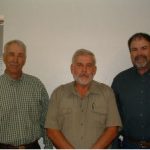Organization touts economic, environmental benefits of hunting
By CAROLYN DRYER, Editor Glendalestar.com |
Members of Hunting Works in Arizona are hopeful they can “put a face to economic wealth, especially in
smaller communities,” while managing and preserving wildlife habitat.
 HWA co-chairs Jerry Weiers, an Arizona State Representative, Tom Britt, a 26-year employee of Arizona
HWA co-chairs Jerry Weiers, an Arizona State Representative, Tom Britt, a 26-year employee of Arizona
Game and Fish Department now retired, and HWA member, Arizona Elk Society President and small-
business owner Steve Clark, resident of Glendale, recently talked about their organization and how they
want to tell the story of hunting in the state.
They said many people do not realize how much economic wealth is created through tags, licenses, fees
and sales taxes paid by hunters. Last year, Britt said, the AG&FD gave a nonprofit special tags to auction
off, and the activity raised $1.4 million that went back into AG&FD coffers for improving habitat and wildlife.
The Arizona Elk Society and Rocky Mountain Elk Foundation together raised money for the Tusayan
pipeline on the South Rim of the Grand Canyon. Of that money, $500,000 went to goods and services
around Flagstaff for concrete, rebar and miscellaneous supplies, Britt said.
“It gets kinda lost in the fuzz,” he said, “all those little things that spread around us, a lot of little hidden
values.
“Hunters are very generous people, 100-percent dedicated to taking care of things.”
Weiers said, “I’m willing to pay for it, but don’t take things away from me.”
Britt said an old law on the books, Pittman Robinson Act of 1937, placed a tax on firearms and ammunition.
The law has since been extended to handguns and archery.
“Opponents of hunting and fishing, to them, if it stopped, if something happened to bird wetlands, the
response would be – government,” Britt said. “Who pays for it? Government is not the answer. It’s been
driven by people who hunt and fish and enjoy wildlife.”
Habitat does not necessarily take care of itself, Britt said. It takes work and money.
“Game and Fish would not exist without hunters,” Weiers said.
“Sixty-seven percent of its budget is paid by hunters,” Britt said.
If citizens stopped hunting today, there would be more devastation of wildlife habitat, Weiers said.
“There would be less habitat for endangered species, and grasslands, once encroached on, certain species
of birds disappear,” Britt said. “A lot of fences on Highway 260 to keep elk off the road are paid for by these
wildlife organizations.”
“We build fences around riparian areas so riparian animals that depend on it can propagate without trespass
by elk,” Clark said.
“It’s win-win across the board,” Britt said.
As for Proposition 109, which was soundly defeated in November, the men said they are not interested in
the politics of hunting; they are interested in educating the public about the benefits, both to wildlife and to
small businesses around the state. To learn more about Hunting Works in Arizona, visit
www.huntingworksforAZ.com.





























































